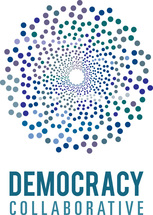Gathering #3: Learning Action/Lab Panelists and Site Visits
Panelists
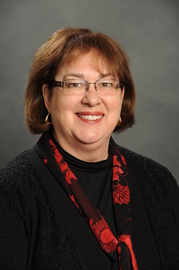
Mary Donnell
Green City Growers Cooperative and Evergreen Business Solutions
[email protected]
Mary Donnell, CEO of Green City Growers Cooperative (GCGC) is responsible for building and managing the 3.25-acre leafy greens, hydroponic greenhouse. Her experience includes leadership roles in the fresh produce industry in supply chain management; national produce sales and marketing; branding and packaging; new product development; quality assurance; international produce procurement; and food safety. She has held key roles in the integration of two fresh produce companies and managed a fresh herb production facility in Florida. Mary has been the featured speaker at many conferences and has given presentations in United States, Europe, and Puerto Rico. Topics have included business management, business development, financial management, marketing, food safety, and renewable energy. In addition to working in the produce industry, Mary was Director of the Ohio State University Extension Agricultural Business Enhancement Center and co-creator and Director of the Ohio Hydroponic Vegetable Program and the Ohio Good Agricultural Practices Program. Mary has a B.A. in Zoology, an M.S. in Horticulture, and an M.B.A.
Green City Growers Cooperative and Evergreen Business Solutions
[email protected]
Mary Donnell, CEO of Green City Growers Cooperative (GCGC) is responsible for building and managing the 3.25-acre leafy greens, hydroponic greenhouse. Her experience includes leadership roles in the fresh produce industry in supply chain management; national produce sales and marketing; branding and packaging; new product development; quality assurance; international produce procurement; and food safety. She has held key roles in the integration of two fresh produce companies and managed a fresh herb production facility in Florida. Mary has been the featured speaker at many conferences and has given presentations in United States, Europe, and Puerto Rico. Topics have included business management, business development, financial management, marketing, food safety, and renewable energy. In addition to working in the produce industry, Mary was Director of the Ohio State University Extension Agricultural Business Enhancement Center and co-creator and Director of the Ohio Hydroponic Vegetable Program and the Ohio Good Agricultural Practices Program. Mary has a B.A. in Zoology, an M.S. in Horticulture, and an M.B.A.
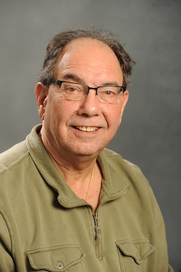
Domenic Fatica
General Manager, Evergreen Energy Solutions
[email protected]
Domenic Fatica, General Manager of Evergreen Energy Solutions, has a construction career spanning 37 years. He has managed projects ranging from high-end residential renovations to large scale commercial construction. He started his career in the concrete business in 1975, where he quickly rose to operations manager for a multi-facility company. In 1981, Domenic founded Lakeshore Construction, Inc., a residential remodeling company, geared toward high-end renovations and new construction. Over a fifteen year period, he produced revenue of $3mm annually. In 1996, Domenic was recruited by Able Contracting Group, where he introduced them to two new national revenue streams – commercial fence and security, which generated over $4mm in new revenue per year. Domenic has also led successful construction startups for Crowley Group, LLC, and Mr. Excavator. Domenic has served three terms as the president of the Cleveland Chapter of the American Institute of Constructors. He holds a B.A. in Public Relations from the Ohio State University, and has lived and worked in and around the Cleveland area his entire life.
General Manager, Evergreen Energy Solutions
[email protected]
Domenic Fatica, General Manager of Evergreen Energy Solutions, has a construction career spanning 37 years. He has managed projects ranging from high-end residential renovations to large scale commercial construction. He started his career in the concrete business in 1975, where he quickly rose to operations manager for a multi-facility company. In 1981, Domenic founded Lakeshore Construction, Inc., a residential remodeling company, geared toward high-end renovations and new construction. Over a fifteen year period, he produced revenue of $3mm annually. In 1996, Domenic was recruited by Able Contracting Group, where he introduced them to two new national revenue streams – commercial fence and security, which generated over $4mm in new revenue per year. Domenic has also led successful construction startups for Crowley Group, LLC, and Mr. Excavator. Domenic has served three terms as the president of the Cleveland Chapter of the American Institute of Constructors. He holds a B.A. in Public Relations from the Ohio State University, and has lived and worked in and around the Cleveland area his entire life.
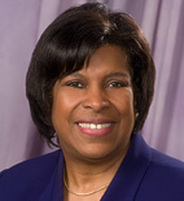
India Pierce Lee
Program Director for Neighborhoods, Housing, and Community Development, Cleveland Foundation
[email protected]
India Pierce Lee joined the Cleveland Foundation in 2006 as program director for neighborhoods, housing, and community development. She oversees the foundation's Greater University Circle Initiative, a unique multi-institutional anchor-based partnership with Case Western Reserve University, Cleveland Clinic, University Hospitals, the City of Cleveland, and philanthropic and non-profit organizations engaged in catalytic projects to revitalize neighborhoods that include transportation, wealth building and economic inclusion, employer-assisted housing, and community engagement. Prior to joining the Cleveland Foundation, India served as senior vice president of programs at Neighborhood Progress Inc., senior program director with the Northeast Ohio Local Initiatives Support Corporation, director of the Empowerment Zone with the City of Cleveland's department of economic development, and executive director of Mt. Pleasant NOW Development Corp. Earlier in her career, she worked as an air traffic control specialist. In 2009, India completed the prestigious Loeb Fellowship from the Graduate School of Design at Harvard University. She spent 10 months on the Harvard campus studying best practices in neighborhood revitalization, with a special interest in sustainability. India has been recognized for outstanding service to Cleveland throughout her career, including receiving keys to the City of Cleveland from former Mayor Michael White and the City of Dallas-Fort Worth by former Mayor Jewell Woods. In January 2012, she was appointed by Mayor Frank Jackson to the City of Cleveland’s Civil Service Commission. In 2011, she was named one of Crain’s Cleveland Business “Women of Note.” India earned a Bachelor of Science degree in management from Cleveland’s Dyke College and is a graduate of the Louis Stokes Fellowship in Community Development from the Mandel School of Applied Social Sciences at Case Western Reserve University, where she obtained a Master of Science degree in social administration.
Program Director for Neighborhoods, Housing, and Community Development, Cleveland Foundation
[email protected]
India Pierce Lee joined the Cleveland Foundation in 2006 as program director for neighborhoods, housing, and community development. She oversees the foundation's Greater University Circle Initiative, a unique multi-institutional anchor-based partnership with Case Western Reserve University, Cleveland Clinic, University Hospitals, the City of Cleveland, and philanthropic and non-profit organizations engaged in catalytic projects to revitalize neighborhoods that include transportation, wealth building and economic inclusion, employer-assisted housing, and community engagement. Prior to joining the Cleveland Foundation, India served as senior vice president of programs at Neighborhood Progress Inc., senior program director with the Northeast Ohio Local Initiatives Support Corporation, director of the Empowerment Zone with the City of Cleveland's department of economic development, and executive director of Mt. Pleasant NOW Development Corp. Earlier in her career, she worked as an air traffic control specialist. In 2009, India completed the prestigious Loeb Fellowship from the Graduate School of Design at Harvard University. She spent 10 months on the Harvard campus studying best practices in neighborhood revitalization, with a special interest in sustainability. India has been recognized for outstanding service to Cleveland throughout her career, including receiving keys to the City of Cleveland from former Mayor Michael White and the City of Dallas-Fort Worth by former Mayor Jewell Woods. In January 2012, she was appointed by Mayor Frank Jackson to the City of Cleveland’s Civil Service Commission. In 2011, she was named one of Crain’s Cleveland Business “Women of Note.” India earned a Bachelor of Science degree in management from Cleveland’s Dyke College and is a graduate of the Louis Stokes Fellowship in Community Development from the Mandel School of Applied Social Sciences at Case Western Reserve University, where she obtained a Master of Science degree in social administration.
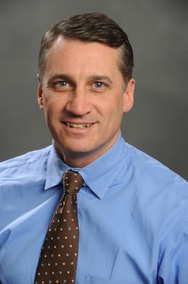
John McMicken
Acting CEO, Evergreen Cooperative Corporation
[email protected]
John McMicken, acting CEO of Evergreen Cooperative Corporation, currently oversees day-to-day operations, and is responsible for ongoing business planning and the evaluation of new service offerings for Evergreen’s three operating entities: Evergreen Energy Solutions (solar), Evergreen Cooperative Laundry, and Green City Growers (hydroponic greenhouse). John comes to Evergreen from Virtical Technologies, LLC, a Cleveland consulting firm he founded in 2009, with over 18 years experience in the technology services field, holding senior level positions in both business development and operations management. He has successfully launched a variety of technology startups, offering services such as: document imaging, web-hosted document management, data storage, and most recently, Desktop as a Service (DaaS). John formerly served as President of Inventus Technologies (providing document management services to law firms) where he was instrumental in opening four new markets over a five year period. His executive-level track record, launching and growing small to mid-sized technology firms, has given John the expertise needed to deliver solutions tailored to meet the needs of clients of all sizes. John holds a Bachelor of Science degree from the College of William and Mary in Williamsburg, Virginia. He currently resides on Cleveland’s east side with his wife, Sarah, and their five sons.
Acting CEO, Evergreen Cooperative Corporation
[email protected]
John McMicken, acting CEO of Evergreen Cooperative Corporation, currently oversees day-to-day operations, and is responsible for ongoing business planning and the evaluation of new service offerings for Evergreen’s three operating entities: Evergreen Energy Solutions (solar), Evergreen Cooperative Laundry, and Green City Growers (hydroponic greenhouse). John comes to Evergreen from Virtical Technologies, LLC, a Cleveland consulting firm he founded in 2009, with over 18 years experience in the technology services field, holding senior level positions in both business development and operations management. He has successfully launched a variety of technology startups, offering services such as: document imaging, web-hosted document management, data storage, and most recently, Desktop as a Service (DaaS). John formerly served as President of Inventus Technologies (providing document management services to law firms) where he was instrumental in opening four new markets over a five year period. His executive-level track record, launching and growing small to mid-sized technology firms, has given John the expertise needed to deliver solutions tailored to meet the needs of clients of all sizes. John holds a Bachelor of Science degree from the College of William and Mary in Williamsburg, Virginia. He currently resides on Cleveland’s east side with his wife, Sarah, and their five sons.
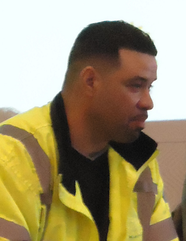
Orlando Santaella Sr.
Employee-Owner, Evergreen Energy Solutions
Orlando Santaella Sr. is a 46 year old male currently employed by Evergreen Energy Solutions. He has been with the company for three years. After several years in the federal penitentiary, he was recommended to the company by his son, who is still employed here. Since joining Evergreen, he has received certifications in Lead Abatement, Basic Weatherization, FAAC Gate Operators, EMX Access Controls, Extreme Efficient Solid State Lighting, and LED Network Systems. In his capacity as a cooperative member, he now performs tasks related to tile setting, basic plumbing, basic electrical, solar panel installation, insulation installation, basic carpentry and roofing, and solar panel installation. Also, as a cooperative member, he now participates in our home ownership program and our new car ownership program.
Employee-Owner, Evergreen Energy Solutions
Orlando Santaella Sr. is a 46 year old male currently employed by Evergreen Energy Solutions. He has been with the company for three years. After several years in the federal penitentiary, he was recommended to the company by his son, who is still employed here. Since joining Evergreen, he has received certifications in Lead Abatement, Basic Weatherization, FAAC Gate Operators, EMX Access Controls, Extreme Efficient Solid State Lighting, and LED Network Systems. In his capacity as a cooperative member, he now performs tasks related to tile setting, basic plumbing, basic electrical, solar panel installation, insulation installation, basic carpentry and roofing, and solar panel installation. Also, as a cooperative member, he now participates in our home ownership program and our new car ownership program.
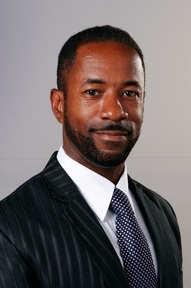
Tim Tramble
Executive Director, Burten, Bell Carr Development Corporation
[email protected]
Tim earned a Master of Public Administration degree from Cleveland State University where he also earned his graduate certificate in Non-profit Management. He obtained his Bachelor’s degree in Environmental Science from Central State University and is certified as an Economic Development Finance Professional by the National Development Council. Among other honors he was the 2005 recipient of the Ohio Community Development Finance Fund’s Meritorious Award for community development, a 2008 American Marshall Memorial Fellow, and was voted the CDC Staff Employee of the Year by the Ohio CDC Association in 2008. He is a member of Leadership Cleveland class of 2010 and is a member of the College of Arts and Science Advisory Board for Central State University. Tim became the executive director of Burten, Bell, Carr Development, Inc. (BBC) in 2000. Under Tim’s leadership BBC has grown from a fledgling staff of 2 with minimal services to a highly productive CDC that delivers a multitude of programs and services. BBC is largely responsible for the nationally renowned revitalization of the Central community, which includes the greatest number of developed and sold homes in Cleveland over the past decade. Currently BBC is transforming the lower Kinsman area that encompasses many new developments including Cleveland’s Urban Agriculture Innovation Zone, a transformation of 28 acres of what was a desolate area of Cleveland known for decades as “The Forgotten Triangle.” BBC was Ohio’s 2012 CDC of the Year.
Executive Director, Burten, Bell Carr Development Corporation
[email protected]
Tim earned a Master of Public Administration degree from Cleveland State University where he also earned his graduate certificate in Non-profit Management. He obtained his Bachelor’s degree in Environmental Science from Central State University and is certified as an Economic Development Finance Professional by the National Development Council. Among other honors he was the 2005 recipient of the Ohio Community Development Finance Fund’s Meritorious Award for community development, a 2008 American Marshall Memorial Fellow, and was voted the CDC Staff Employee of the Year by the Ohio CDC Association in 2008. He is a member of Leadership Cleveland class of 2010 and is a member of the College of Arts and Science Advisory Board for Central State University. Tim became the executive director of Burten, Bell, Carr Development, Inc. (BBC) in 2000. Under Tim’s leadership BBC has grown from a fledgling staff of 2 with minimal services to a highly productive CDC that delivers a multitude of programs and services. BBC is largely responsible for the nationally renowned revitalization of the Central community, which includes the greatest number of developed and sold homes in Cleveland over the past decade. Currently BBC is transforming the lower Kinsman area that encompasses many new developments including Cleveland’s Urban Agriculture Innovation Zone, a transformation of 28 acres of what was a desolate area of Cleveland known for decades as “The Forgotten Triangle.” BBC was Ohio’s 2012 CDC of the Year.
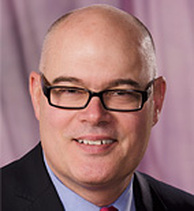
Walter Wright
Project Director of the Greater University Circle Community Wealth Building Initiative, the Cleveland Foundation
[email protected]
Walter Wright joined the Cleveland Foundation in 2011 as the project director of the Greater University Circle Community Wealth Building Initiative. This effort is supported by Living Cities, a collaboration of 22 of the nation’s largest foundations and financial institutions. Cleveland is one of five cities nationally selected to participate. The $14.77 million, three-year award of grant and loan funds to the Cleveland Foundation will support community and enhance wealth-building opportunities in Greater University Circle and new development in the Health Tech corridor. Prior to joining the Cleveland Foundation, Walter served as senior program officer for Neighborhood Progress, Inc. In this role, he was responsible for the management of the Cleveland Neighborhood Partnership Program, where he oversaw a $1.6 million budget and a multi-year, comprehensive support program for select community development corporations. Walter earned a bachelor’s degree in art education and a master of arts in education from Case Western Reserve University. He also holds a certificate in studio art from the Cleveland Institute of Art.
Project Director of the Greater University Circle Community Wealth Building Initiative, the Cleveland Foundation
[email protected]
Walter Wright joined the Cleveland Foundation in 2011 as the project director of the Greater University Circle Community Wealth Building Initiative. This effort is supported by Living Cities, a collaboration of 22 of the nation’s largest foundations and financial institutions. Cleveland is one of five cities nationally selected to participate. The $14.77 million, three-year award of grant and loan funds to the Cleveland Foundation will support community and enhance wealth-building opportunities in Greater University Circle and new development in the Health Tech corridor. Prior to joining the Cleveland Foundation, Walter served as senior program officer for Neighborhood Progress, Inc. In this role, he was responsible for the management of the Cleveland Neighborhood Partnership Program, where he oversaw a $1.6 million budget and a multi-year, comprehensive support program for select community development corporations. Walter earned a bachelor’s degree in art education and a master of arts in education from Case Western Reserve University. He also holds a certificate in studio art from the Cleveland Institute of Art.
Site Visits
Burten, Bell, Carr Development Inc. and CorUcopia Place
http://www.bbcdevelopment.org/ and http://www.bbcdevelopment.org/cornucopia-bbcd/
Burten, Bell, Carr Development, Incorporated (BBC) is a non-profit community development corporation founded in 1990 that serves Cleveland’s Central, Kinsman, and Garden Valley neighborhoods. Its mission is to enhance the quality of life for residents of Ward 5 by initiating and cultivating housing, retail, employment, and recreation opportunities through effective partnerships with residents, community groups, government, corporations and institutions.
In an effort to restore the residential fabric of neighborhoods devastated by blight and abandonment, BBC has supported 11 housing developments with a sum total of over 750 housing units, 400 of which are single-family homes. Additionally, BBC has developed a number of commercial projects, including, Arbor Park Place, the first large-scale retail development project in Cleveland’s Central neighborhood in over forty years, and Bridgeport Place, which houses both the social enterprise Bridgeport Café, and the community facility CornUcopia Place.
BBC’s social enterprise development work includes opening the Bridgeport Café in 2012 which makes locally grown food available in the Kinsman neighborhood, employs local residents, and runs a mobile market that sells fresh fruits and vegetables in neighborhoods that don’t have easy access to grocery stores; and starting the Neighborhood Landscape Enterprise in 2009 that employs residents of BBC’s neighborhoods to beautify residential and commercial properties while having the opportunity to pursue a degree in Plant Science and Landscape Technology.
BBC also partnered with Green City Growers, assisting with the initial real estate development and community outreach aspects of the project, and is currently in the process of transforming 28 acres of vacant land in a “forgotten” inner-city neighborhood into an Urban Agriculture Innovation Zone. This zone will produce local food and bio-fuels, clean contaminated land with phyto-remediation, and retain storm water runoff. Two partners, Rid-All Green Partnership and Ohio State University Extension, are currently farming on approximately seven-and-a-half acres of formerly vacant land.
BBC’s CornUcopia Place is also our home for our Cleveland gathering. CornUcopia is a community facility that provides nutrition education, cooking demonstrations, and open space for private events and functions on a rental basis, as well as a harvest preparation station for use by local market gardeners.
Green City Growers
http://evergreencooperatives.com/business/green-city-growers/
Green City Growers Cooperative Inc., part of the Evergreen Cooperatives, is one of the country’s largest urban greenhouses. At 3.25-acres, this hydroponic greenhouse located on a 10-acre site in the Central neighborhood of Cleveland aims to produce three million heads of lettuce and 300,000 pounds of herbs annually, with a focus on sales to vendors within a 50-mile radius from its location. Officially opened on February 25, 2013, the greenhouse also has 15,000 square feet of packinghouse and office space, and employs 24 workers, who will become eligible for ownership after a year of employment.
Green City Growers, along with all of the Evergreen Cooperatives, is part of the economic inclusion strategy of the Greater University Circle Initiative, a comprehensive community development initiative led by The Cleveland Foundation and engaging anchor institutions, local and national foundations, financial institutions, community groups, and the city of Cleveland. With guidance from the Economic Development Department of the City of Cleveland, the greenhouse was financed using, among other sources, a low-interest loan from the Evergreen Cooperative Development Fund (with seed funding from The Cleveland Foundation and support from additional foundations and area anchor institutions), a Housing and Urban Development (HUD) Section 108 Community Development Grant guaranteed loan, a HUD Brownfield and Economic Development Initiative (BEDI) grant, and New Market Tax Credits. Green City Growers receives support and strategic guidance from the Evergreen Cooperative Corporation, the holding company for the three Evergreen Cooperatives, which also manages a revolving loan fund, a land holding company, and a shared-services company (Evergreen Business Services).
Evergreen Cooperative Laundry
http://evergreencooperatives.com/business/evergreen-laundry/
Opened in 2009, Evergreen Cooperative Laundry was the first of the three Evergreen Cooperatives. The laundry currently employs 43 people, and provides affordable, water efficient green laundry service to local anchor institutions, including University Hospitals. The laundry is the greenest commercial-scale health care bed linen laundry in northeast Ohio, using state-of-the-art washers, which require only 0.8 gallons of water per pound of laundry compared to the industry standard of three gallons. In conjunction with energy conservation measures installed to reduce heat used for water, dryers and ironing, the facility achieved LEED (Leadership in Energy & Environmental Design) “gold” certification.
Like, Green City Growers, the Laundry was financed through a variety of sources, including a low-interest loan from the Evergreen Cooperative Development Fund (with seed funding from The Cleveland Foundation and support from additional foundations and area anchor institutions), loans from local community development institutions (including the Common Wealth Revolving Loan Fund), and, as with the greenhouse, a HUD 108 loan and new markets tax credits. While the laundry earned almost $1 million in revenues washing 1.9 million pounds of laundry in 2012, it failed to break even. In 2014, however, the Laundry looks as though it will turn a profit for the first time since it opened its doors.
http://www.bbcdevelopment.org/ and http://www.bbcdevelopment.org/cornucopia-bbcd/
Burten, Bell, Carr Development, Incorporated (BBC) is a non-profit community development corporation founded in 1990 that serves Cleveland’s Central, Kinsman, and Garden Valley neighborhoods. Its mission is to enhance the quality of life for residents of Ward 5 by initiating and cultivating housing, retail, employment, and recreation opportunities through effective partnerships with residents, community groups, government, corporations and institutions.
In an effort to restore the residential fabric of neighborhoods devastated by blight and abandonment, BBC has supported 11 housing developments with a sum total of over 750 housing units, 400 of which are single-family homes. Additionally, BBC has developed a number of commercial projects, including, Arbor Park Place, the first large-scale retail development project in Cleveland’s Central neighborhood in over forty years, and Bridgeport Place, which houses both the social enterprise Bridgeport Café, and the community facility CornUcopia Place.
BBC’s social enterprise development work includes opening the Bridgeport Café in 2012 which makes locally grown food available in the Kinsman neighborhood, employs local residents, and runs a mobile market that sells fresh fruits and vegetables in neighborhoods that don’t have easy access to grocery stores; and starting the Neighborhood Landscape Enterprise in 2009 that employs residents of BBC’s neighborhoods to beautify residential and commercial properties while having the opportunity to pursue a degree in Plant Science and Landscape Technology.
BBC also partnered with Green City Growers, assisting with the initial real estate development and community outreach aspects of the project, and is currently in the process of transforming 28 acres of vacant land in a “forgotten” inner-city neighborhood into an Urban Agriculture Innovation Zone. This zone will produce local food and bio-fuels, clean contaminated land with phyto-remediation, and retain storm water runoff. Two partners, Rid-All Green Partnership and Ohio State University Extension, are currently farming on approximately seven-and-a-half acres of formerly vacant land.
BBC’s CornUcopia Place is also our home for our Cleveland gathering. CornUcopia is a community facility that provides nutrition education, cooking demonstrations, and open space for private events and functions on a rental basis, as well as a harvest preparation station for use by local market gardeners.
Green City Growers
http://evergreencooperatives.com/business/green-city-growers/
Green City Growers Cooperative Inc., part of the Evergreen Cooperatives, is one of the country’s largest urban greenhouses. At 3.25-acres, this hydroponic greenhouse located on a 10-acre site in the Central neighborhood of Cleveland aims to produce three million heads of lettuce and 300,000 pounds of herbs annually, with a focus on sales to vendors within a 50-mile radius from its location. Officially opened on February 25, 2013, the greenhouse also has 15,000 square feet of packinghouse and office space, and employs 24 workers, who will become eligible for ownership after a year of employment.
Green City Growers, along with all of the Evergreen Cooperatives, is part of the economic inclusion strategy of the Greater University Circle Initiative, a comprehensive community development initiative led by The Cleveland Foundation and engaging anchor institutions, local and national foundations, financial institutions, community groups, and the city of Cleveland. With guidance from the Economic Development Department of the City of Cleveland, the greenhouse was financed using, among other sources, a low-interest loan from the Evergreen Cooperative Development Fund (with seed funding from The Cleveland Foundation and support from additional foundations and area anchor institutions), a Housing and Urban Development (HUD) Section 108 Community Development Grant guaranteed loan, a HUD Brownfield and Economic Development Initiative (BEDI) grant, and New Market Tax Credits. Green City Growers receives support and strategic guidance from the Evergreen Cooperative Corporation, the holding company for the three Evergreen Cooperatives, which also manages a revolving loan fund, a land holding company, and a shared-services company (Evergreen Business Services).
Evergreen Cooperative Laundry
http://evergreencooperatives.com/business/evergreen-laundry/
Opened in 2009, Evergreen Cooperative Laundry was the first of the three Evergreen Cooperatives. The laundry currently employs 43 people, and provides affordable, water efficient green laundry service to local anchor institutions, including University Hospitals. The laundry is the greenest commercial-scale health care bed linen laundry in northeast Ohio, using state-of-the-art washers, which require only 0.8 gallons of water per pound of laundry compared to the industry standard of three gallons. In conjunction with energy conservation measures installed to reduce heat used for water, dryers and ironing, the facility achieved LEED (Leadership in Energy & Environmental Design) “gold” certification.
Like, Green City Growers, the Laundry was financed through a variety of sources, including a low-interest loan from the Evergreen Cooperative Development Fund (with seed funding from The Cleveland Foundation and support from additional foundations and area anchor institutions), loans from local community development institutions (including the Common Wealth Revolving Loan Fund), and, as with the greenhouse, a HUD 108 loan and new markets tax credits. While the laundry earned almost $1 million in revenues washing 1.9 million pounds of laundry in 2012, it failed to break even. In 2014, however, the Laundry looks as though it will turn a profit for the first time since it opened its doors.

